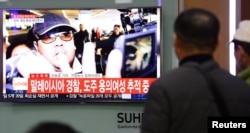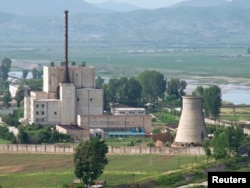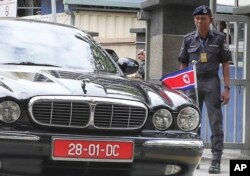Amid calls by U.S. lawmakers for North Korea to be relisted as a state sponsor of terrorism following the apparent assassination of the half-brother of North Korean leader Kim Jong Un, there's an apparent lack of consensus among experts on whether his death is a terrorist attack.
Ted Yoho, the Florida Republican who is chairman of the House Foreign Affairs Subcommittee on Asia and the Pacific, told VOA there is a "strong consensus" in Congress on returning the North to the U.S. list of state sponsors of terrorism.
Kim Jong Nam, 45, died Feb. 13 shortly after two women allegedly smeared the VX nerve agent on his face at Malaysia's Kuala Lumpur International Airport. VX is a highly toxic substance which is classified as a weapon of mass destruction under the 1993 Chemical Weapons Convention.
Malaysian police have detained the women and one North Korean national. Seven other North Koreans, including a diplomat based in the Malaysian capital, are currently wanted for questioning.
Although the police are still trying to determine if the North was responsible for the assassination, South Korea's intelligence agency said the killing is state-led terrorism sponsored by the North, according to South Korean lawmakers briefed by the agency.
Currently, three countries are on the U.S. list of state sponsors of terrorism — Iran, Sudan and Syria. They are subject to U.S. financial sanctions, which include restrictions on U.S. foreign assistance, a ban on arms-related exports and sales, and controls on exports of dual-use items.
Call for reinstatement
The U.S. designated North Korea as a state sponsor of terrorism after the country bombed a Korean Air flight near Myanmar in 1987, killing 115 people onboard. Since then, the communist state is not known to have sponsored any terrorist acts, according to the U.S. State Department. In 2008, the U.S. removed the North from the list as part of a nuclear deal, in which Pyongyang agreed to disable its plutonium plant and allow some inspections. However, the North's recent provocations have prompted some U.S. lawmakers to seek to repeal the decision. Following the latest incident in Malaysia, there is another push in Congress to return the North to the terrorism blacklist.
In order to put North Korea back on the list, the U.S. secretary of state "must determine" that the North has "repeatedly provided support for acts of international terrorism," according to the State Department. This, nonetheless, could be difficult as the U.S. government and Congress have often disagreed on what constitutes state-sponsored international terrorism. The Obama administration refused repeated calls from Congress to reinstate the North to the list, citing the statutory requirement for such action.
Statutory requirements
Joshua Stanton, a Washington, D.C.-based attorney who specializes in sanctions and also maintains the influential One Free Korea blog, believes that the assassination of Kim Jong Nam, coupled with its previous bellicose acts, meets statutory requirements to put Pyongyang back on the terrorism blacklist. According to Stanton, the regime has carried out a series of what he called terrorist acts such as the shelling of a South Korean island in 2010 and the cyberattack on Sony Pictures in 2014 widely believed as staged over the film The Interview, an action-comedy centered on an assassination plot against Kim Jong Un.
"I think it's going to be difficult for the administration to resist the pressure to [return North Korea to the list] at this point," Stanton told VOA.
Stanton, who also serves as an adviser to the U.S. House Foreign Affairs Committee, added there is little doubt that the Kuala Lumpur killing was a terrorist act because a banned chemical weapon was used against a civilian at a public airport in a third country.
Anthony Ruggiero, who worked in the U.S. government for more than 17 years, told VOA that although there is a restricted legal interpretation of what acts of international terrorism look like, the Kim Jong Nam case "crystalizes the effort to look at North Korea as a terrorist state."
"I think you can make a case that, at least since 2008, there have been repeated acts of international terrorism, which they have supported, or in the case of Kim Jong Nam, have done themselves," said the former Treasury Department official, who is now a senior fellow at the Foundation for Defense of Democracies.
Gray zone
Daniel Benjamin, who served as the U.S. State Department's counterterrorism coordinator in the Obama administration, however, argues that the killing in Malaysia cannot be readily construed as an act of terrorism. In an interview with VOA, Benjamin, who is now the director of the Dickey Center for International Understanding at Dartmouth College, said the case lies in a "gray zone."
While the apparent use of the deadly nerve agent in the killing is within legal parameters of designating the North as a terrorist state, assassination by itself cannot be interpreted as an act of terrorism, according to Benjamin.
"So this is a very unusual case," said the former official.
"The law is written in such a way that I think that the administration has a certain amount of flexibility in determining whether or not a country qualifies as a state sponsor," he added.
Citing a senior South Korean official, South Korean news media reported Monday the U.S. was mulling the reinstatement. In response, a State Department spokesperson said Tuesday the State Department constantly reviews "all of the available information and intelligence, from a variety of sources" on the North.
"Even without being designated as a State Sponsor of Terrorism, North Korea remains among the most heavily sanctioned countries in the world," the spokesperson said in an email sent to VOA.
Cho Eunjung and Baik Sungwon contributed to this report.











